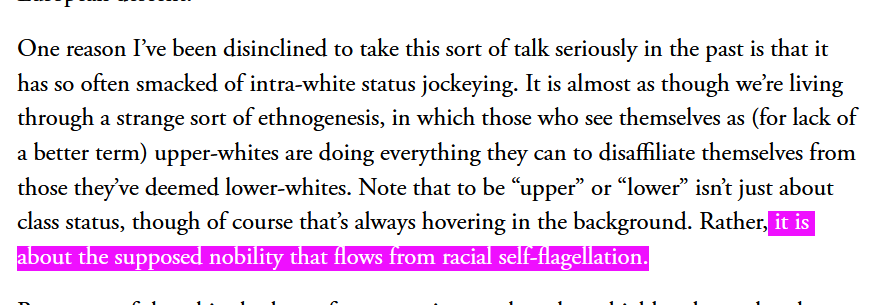"Why are young Asians now woke?"
tl;dr: They're signalling.
But this raises an interesting question: How do some groups manage to use politics to advocate for their own interest, whilst others end up in some signalling/mutual defection equilibrium? https://unherd.com/2020/10/why-young-asians-are-now-woke/
tl;dr: They're signalling.
But this raises an interesting question: How do some groups manage to use politics to advocate for their own interest, whilst others end up in some signalling/mutual defection equilibrium? https://unherd.com/2020/10/why-young-asians-are-now-woke/
Let's sketch the mutual defection ingroup-self-harm equilibrium:
Imagine a large number of people from an identity group. Each of them is asked whether it's OK for their group to be discriminated against.
Imagine a large number of people from an identity group. Each of them is asked whether it's OK for their group to be discriminated against.
Let's take a group called "trees".
 : Is it OK for plant university to discriminate against trees?
: Is it OK for plant university to discriminate against trees?
 : Yes!
: Yes!
 : Yes!
: Yes!
 : No.
: No.
 : Oh, why is that Tree #3? Are you worried you wouldn't make the cut? Are you like the weakest tree?
: Oh, why is that Tree #3? Are you worried you wouldn't make the cut? Are you like the weakest tree?
 : Uh........
: Uh........
 : Is it OK for plant university to discriminate against trees?
: Is it OK for plant university to discriminate against trees? : Yes!
: Yes!  : Yes!
: Yes!  : No.
: No. : Oh, why is that Tree #3? Are you worried you wouldn't make the cut? Are you like the weakest tree?
: Oh, why is that Tree #3? Are you worried you wouldn't make the cut? Are you like the weakest tree?  : Uh........
: Uh........
 : Are you fresh off the boat from tree-land? Do you not understand how upper-class politics in America works Tree #3?
: Are you fresh off the boat from tree-land? Do you not understand how upper-class politics in America works Tree #3? : Uh, no, I, uuum ...
: Uh, no, I, uuum ... : Anyway, we have 2 for and 1 against, so we're gonna discriminate against trees.
: Anyway, we have 2 for and 1 against, so we're gonna discriminate against trees.
This sets the trees up in a tragedy of the commons game against each other. They could all coordinate to say that anti-tree discrimination is bad and enjoy a higher total reward.
But with no coordination mechanism, they end up all defecting against their own group.
But with no coordination mechanism, they end up all defecting against their own group.
The game theory of tragedy of the commons is brutal.
Even if there are 1000 trees and 999 of them will get into plant university without discrimination but only 1 of them will get in with discrimination, the "all defect" strategy is the unique Nash Equilibrium!
Even if there are 1000 trees and 999 of them will get into plant university without discrimination but only 1 of them will get in with discrimination, the "all defect" strategy is the unique Nash Equilibrium!
Let's look at a different group, the flowers, who can win this:
 : Is it OK for plant university to discriminate against flowers?
: Is it OK for plant university to discriminate against flowers?
 : No.
: No.
 : No.
: No.
 : Yes, Why not? There are some good arguments for it!
: Yes, Why not? There are some good arguments for it!
 : Oh, we've got a rotten flower here.
: Oh, we've got a rotten flower here.
 : Flower #3 smells bad.
: Flower #3 smells bad.
 : Is it OK for plant university to discriminate against flowers?
: Is it OK for plant university to discriminate against flowers? : No.
: No.  : No.
: No.  : Yes, Why not? There are some good arguments for it!
: Yes, Why not? There are some good arguments for it!  : Oh, we've got a rotten flower here.
: Oh, we've got a rotten flower here. : Flower #3 smells bad.
: Flower #3 smells bad.
 : flower #3 is a rotten flower. Pour pesticide on it.
: flower #3 is a rotten flower. Pour pesticide on it. Groups that coordinate well on this often have their own equivalent of "rotten flower" - a traitor to the group - with special vocabulary and traditions of punishing and excluding them.
There are undoubtedly other methods too: strong taboos against criticism of their group, and demonization of those who do it (even their own group members). Ideological Superweapons targeted at any defectors. https://slatestarcodex.com/2014/05/12/weak-men-are-superweapons/
Asians in the USA as a group haven't taken the time to construct these superweapons and organisations to impose them. Different types of Asians have historical grievances against each other.
Contrast this with the relatively unified and strong identities of the groups that you are not allowed to discriminate against, and the cultural power that they have.
Perhaps the conclusion of this issue is that there are certain prerequisites for political power (cultural power, unity/strong identity, good historical grievance narratives), and Asian Americans just don't have them.
Thus they default to a fairly weak status, and ended up as a bottom tier group in the progressive coalition.

 Read on Twitter
Read on Twitter


